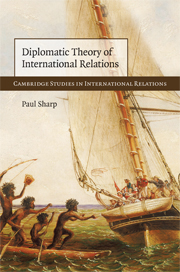Book contents
- Frontmatter
- Contents
- Acknowledgements
- Introduction
- Part I Traditions of international thought and the disappointments of diplomacy
- Part II Elements of a diplomatic tradition of international thought
- Part III Diplomatic understanding and international societies
- 6 Using the international society idea
- 7 Integration–disintegration
- 8 Expansion–contraction
- 9 Concentration–diffusion
- Part IV Thinking diplomatically about international issues
- Conclusion
- Bibliography
- Index
- Cambridge Studies in International Relations
7 - Integration–disintegration
Published online by Cambridge University Press: 05 June 2012
- Frontmatter
- Contents
- Acknowledgements
- Introduction
- Part I Traditions of international thought and the disappointments of diplomacy
- Part II Elements of a diplomatic tradition of international thought
- Part III Diplomatic understanding and international societies
- 6 Using the international society idea
- 7 Integration–disintegration
- 8 Expansion–contraction
- 9 Concentration–diffusion
- Part IV Thinking diplomatically about international issues
- Conclusion
- Bibliography
- Index
- Cambridge Studies in International Relations
Summary
By international integration we generally refer to the processes by which states merge with one another to form a larger unit, although, more often, what we mean is the processes by which life within them, or aspects of that life, becomes merged with life in other states under a new and broader political dispensation. This complicates the idea by leaving “final” destinations open. EU experience, for example, suggests that states may integrate without any new entity, and certainly not a new state, emerging. By international disintegration, we refer to the opposite of all this but, in fact, we rarely talk about it as such. This is partly because most processes of international disintegration are viewed as the antithesis or backwash of integrative processes pointing to the future and, thus, in which we are more interested. However, it is also because we see disintegration in terms of particular states coming apart, rather than the international societies of which they are members.
Even where, as in parts of Africa, for example, the incidence of failed and disintegrating states supports a case for talking about a failed and disintegrating society of states, most of our attention remains fixed on the particular states in question and how to put them back together again. This is so because we see both international integration and disintegration taking place within an international society whose broad outlines we assume are settled.
- Type
- Chapter
- Information
- Diplomatic Theory of International Relations , pp. 123 - 148Publisher: Cambridge University PressPrint publication year: 2009



